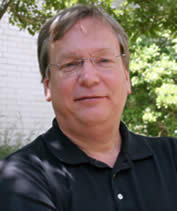Warren Knudson, Ph.D.

Professor Emeritus
email: knudsonw@ecu.edu
B.S., Elmhurst College
Ph.D., University of Illinois at Urbana-Champaign
Postdoctoral Fellow, Tufts University School of Medicine
Research
My laboratory is interested in the role cell-matrix interactions play in tissue homeostasis. In particular, our research has focused on cell-matrix interactions that relate to the matrix macromolecule hyaluronan. Changes in hyaluronan metabolism may underlie the cartilage degeneration associated with osteoarthritis. To better understand the metabolism of hyaluronan in cartilage, we have focused on the enzymes that synthesize hyaluronan (hyaluronan synthases), cellular hyaluronidases and, the principal hyaluronan receptor, CD44. We were the first laboratory to identify HAS2 as the primary hyaluronan synthase used by articular chondrocytes. We have cloned two of three critical lysosomal hyaluronidases HYAL1, HYAL2, examined their function and distribution, inhibited their expression by siRNA and antisense and, characterized the promoter of region of the HYAL2 hyaluronidase. We have shown that changes in CD44 receptor occupancy in chondrocytes affect signaling events such as p38 MAPK pathways and NF-kB resulting in increases in the matrix metalloproteinases, MMP-3 and MMP-13 as well as ADAMTS-4 and ADAMTS-5. We have also demonstrated the role of CD44 as an endocytosis receptor for hyaluronan and have generated point mutations within full length CD44 that block internalization but do interfere with hyaluronan binding. We have determined that the internalization of aggrecan G1 domains that remain bound to hyaluronan after aggrecanolysis require CD44. CD44 expression was knocked down by siRNA or function by CD44-DN. Both approaches prevented the retention and internalization of G1-ITEGE. Inhibition of CD44 transit into lipid rafts blocked the endocytosis of G1-ITEGE but not the retention at the cell surface. Additionally, chondrocytes or fibroblasts derived from Cd44-/- mice exhibited little capacity for retention and internalization of exogenous G1-ITEGE. The consequence of a lack of chondrocyte-mediated endocytosis of these domains in cartilage of the CD44 null mice was the accumulation of the degradation fragments within the tissue. Our current work focuses on the transfer of HAS and CD44 transgenes into cartilage and chondrocytes. These strategies allow us to elucidate the functional role of hyaluronan and CD44 in maintaining cartilage homeostasis. Quite unexpectedly however, we recently determined that overexpression of HAS2 transgenes into osteoarthritic chondrocytes did more that affect hyaluronan levels but rather, resulted in the reversion of an aberrant energy metabolism of these cells, due in part to shifts in usage of UDP-GlcUA and UDP-GlcNAc precursors. We identified other agents that provide the same anti-catabolic, anti-inflammatory effects as HAS2 overexpression which led us to define new intriguing mechanisms on how to limit the effects of osteoarthritis by manipulating metabolism. Moreover one of our agents, namely 4-methyumbelliferone, successfully blocked osteoarthritis in vivo in mice following medial meniscus transection.
Selected Publications
Tsuchiya, S., Y. Ohashi, S. Ishizuka, N. Ishiguro, D.P. O’Rourke, C.B. Knudson, and W. Knudson. 2019. Suppression of murine osteoarthritis by 4-methylumbelliferone. J. Orthopedic Res. In press.
Terabe, K., Y. Ohashi, S. Tsuchiya, S. Ishizuka, C.B. Knudson, and W. Knudson. 2019. Chondroprotective effects of 4-methylumbelliferone and hyaluronan synthase-2 overexpression involve changes in chondrocyte energy metabolism. J. Biol. Chem. 294: 17799-17818.
Sobue, Y., N. Takahashi, Y. Ohashi, T. Kobayakawa, K. Terabe, W. Knudson, C.B. Knudson, N. Ishiguro, T. Kojima. 2019. Inhibition of CD44 intracellular domain production suppresses bovine articular chondrocyte de-differentiation induced by excessive mechanical stress loading. Sci. Reports. 9:14901.
Ishizuka, S., S. Tsuchiya, Y. Ohashi, K. Terabe, E.B. Askew, N. Ishizuka, C.B. Knudson, and W. Knudson. 2019. Hyaluronan synthase 2 (HAS2) overexpression diminishes the procatabolic activity of chondrocytes by a mechanism independent of extracellular hyaluronan. J. Biol. Chem. 294:13562-13579.
Knudson W., S. Ishizuka, K. Terabe, E.B. Askew, and C.B. Knudson. 2019. The pericellular hyaluronan of articular chondrocytes. Matrix Biol. (Invited Review), 78-79:32-46.
Terabe, K., N. Takahashi, M. Cobb, E.B. Askew, C.B. Knudson, and W. Knudson. 2019. Simvastatin Promotes Restoration of Chondrocyte Morphology and Phenotype. Arch Biochem. Biophys. 665: 1-11.
Ishizuka, S., E.B. Askew, N. Ishizuka, C.B. Knudson, and W. Knudson. 2016. 4-methyl-umbelliferone diminishes catabolically-activated articular chondrocytes and cartilage explants via a mechanism independent of hyaluronan inhibition. J. Biol. Chem. 291: 12087-12104.
Yuang, Y., E.B. Askew, C.B. Knudson, and W. Knudson. 2016. CRISPR/Cas9 knockout of HAS2 in rat chondrosarcoma chondrocytes demonstrates the requirement of hyaluronan for aggrecan retention. Matrix Biol. 56: 74-94.
View PubMed Publications for further listings
Former Students and Post-Doctoral Fellows
| Name | Title | Location |
|---|---|---|
| Wataru Ariyoshi, D.D.S., Ph.D. | Associate Professor | Division of Infection and Molecular Biology, Department of Health Promotion, Kyushu Dental College, Kitakyushu, Fukuoka, Japan |
| Emily Askew, Ph.D. | Teaching Associate Professor | Department of Anatomy and Cell Biology, East Carolina University, Greenville, NC |
| Ben Danielson, Ph.D. | Immunology Scientist | CERo Pharmaceuticals, South San Francisco, CA |
| Yi Huang, Ph.D. | Postdoctoral Research Fellow | Department of Pathology, The University of Texas Southwestern Medical Center, Dallas, TX |
| Shinya Ishizuka, Ph.D., M.D. | Director of Orthopaedics | Nakatsugawa Municipal Hospital, Gifu, Japan |
| Liliana Mellor, Ph.D. | Staff Scientist | Spanish National Cancer Research Centre, Madrid, Spain |
| Yoshifumi Ohashi, M.D. | Physician | Department of Orthopaedic Surgery, Nagoya Medical Center, Nagoya, Japan |
| Nobunori Takahashi, M.D., Ph.D. | Physician | Department of Orthopaedic Surgery, Nagoya Medical Center, Nagoya, Japan |
| Kenya Terabe, Ph.D., M.D. | Physician | Department of Orthopaedic Surgery, Nagoya Medical Center, Nagoya, Japan |
| Sai Thankamony, Ph.D | Scientist 1 | Translational Sciences, Biogen, Boston, MA |
| Saho Tsuchiya, M.D. | Orthopaedic Surgery Fellow | University of Calgary, Calgary, Alberta, Canada |
| Roberta Veluci, Ph.D | Quality Assurance Manager | Thermo Fisher Scientific, Greenville, NC |